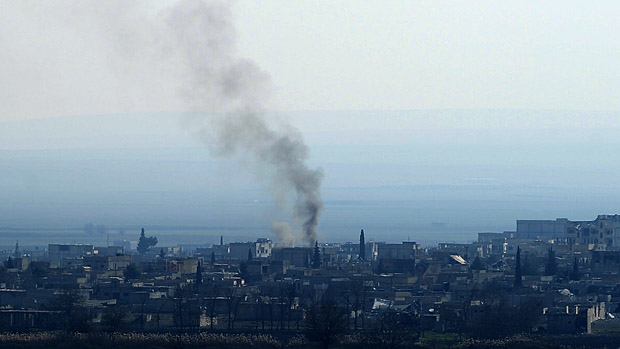Islamic State: Kurds expel militants from key town of Kobane
Celebratory gunfire echoed across the strategic border town as Kurdish forces raised their flag in victory

A free daily email with the biggest news stories of the day – and the best features from TheWeek.com
You are now subscribed
Your newsletter sign-up was successful
Kurdish forces say they have successfully expelled Islamic State fighters from the embattled Syrian border town of Kobane with the help of US-led airstrikes.
"Congratulations to humanity, Kurdistan, and the people of Kobane on the liberation of Kobane," the Kurdish People's Protection Units (YPG) spokesman Polat Jan declared on social media.
US Central Command said the YPG now controlled 90 per cent of the town and congratulated the Kurdish fighters on the victory, but said there was still a long way to go before the jihadists were defeated.
The Week
Escape your echo chamber. Get the facts behind the news, plus analysis from multiple perspectives.

Sign up for The Week's Free Newsletters
From our morning news briefing to a weekly Good News Newsletter, get the best of The Week delivered directly to your inbox.
From our morning news briefing to a weekly Good News Newsletter, get the best of The Week delivered directly to your inbox.
"While the fight against Isil (IS) is far from over, Isil's failure in Kobane has denied them one of their strategic objectives," it said.
At least 1,800 people are believed to have died in the four-month siege, prompting much of the civilian population to flee to neighbouring Turkey, according to the Syrian Observatory for Human Rights.
The victory in Kobane is seen as a symbolic and strategic blow to IS, which controls swathes of territory across Iraq and Syria. The town serves as a key access route into Turkey and has been at the centre of much of the fighting in the region.
If Kobane were under IS control, the militants would be in a position where they would "directly threaten" Turkey, a key Nato-ally, the New York Times reports. A setback in Kobane would have exposed "the fragility of the American plan and hand the Islamic State an important victory," it says.
A free daily email with the biggest news stories of the day – and the best features from TheWeek.com
However, their defeat in Kobane "does not necessarily mean [IS] are losing overall," warns the BBC's Paul Wood. "Syrian opposition sources say IS actually have more territory under their control now than when the United States and its allies started bombing, last August," he points out.
-
 The Week Unwrapped: Do the Freemasons have too much sway in the police force?
The Week Unwrapped: Do the Freemasons have too much sway in the police force?Podcast Plus, what does the growing popularity of prediction markets mean for the future? And why are UK film and TV workers struggling?
-
 Properties of the week: pretty thatched cottages
Properties of the week: pretty thatched cottagesThe Week Recommends Featuring homes in West Sussex, Dorset and Suffolk
-
 The week’s best photos
The week’s best photosIn Pictures An explosive meal, a carnival of joy, and more
-
 Epstein files topple law CEO, roil UK government
Epstein files topple law CEO, roil UK governmentSpeed Read Peter Mandelson, Britain’s former ambassador to the US, is caught up in the scandal
-
 Iran and US prepare to meet after skirmishes
Iran and US prepare to meet after skirmishesSpeed Read The incident comes amid heightened tensions in the Middle East
-
 Syria’s Kurds: abandoned by their US ally
Syria’s Kurds: abandoned by their US allyTalking Point Ahmed al-Sharaa’s lightning offensive against Syrian Kurdistan belies his promise to respect the country’s ethnic minorities
-
 Israel retrieves final hostage’s body from Gaza
Israel retrieves final hostage’s body from GazaSpeed Read The 24-year-old police officer was killed during the initial Hamas attack
-
 China’s Xi targets top general in growing purge
China’s Xi targets top general in growing purgeSpeed Read Zhang Youxia is being investigated over ‘grave violations’ of the law
-
 Syria’s Islamic State problem
Syria’s Islamic State problemIn The Spotlight Fragile security in prison camps leads to escape of IS fighters
-
 Panama and Canada are negotiating over a crucial copper mine
Panama and Canada are negotiating over a crucial copper mineIn the Spotlight Panama is set to make a final decision on the mine this summer
-
 Why Greenland’s natural resources are nearly impossible to mine
Why Greenland’s natural resources are nearly impossible to mineThe Explainer The country’s natural landscape makes the task extremely difficult